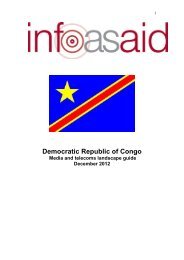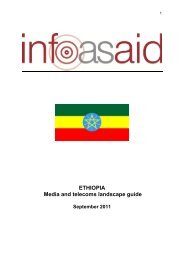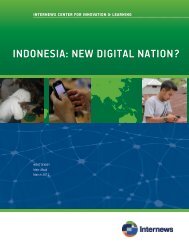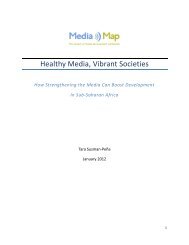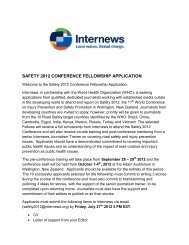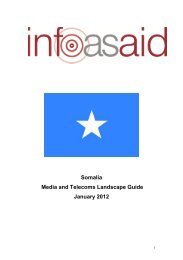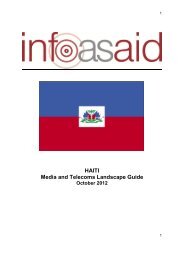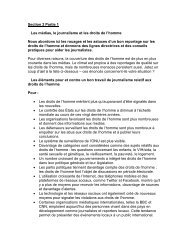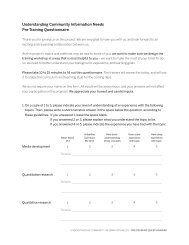STArTInG A LOCAL RADiO stAtiOn - Nai
STArTInG A LOCAL RADiO stAtiOn - Nai
STArTInG A LOCAL RADiO stAtiOn - Nai
- No tags were found...
You also want an ePaper? Increase the reach of your titles
YUMPU automatically turns print PDFs into web optimized ePapers that Google loves.
Section 7: ethics and media law5. Works and materials which are contrary to the Constitution and are considered a crime by the PenalCode.6. Publicizing and dissemination (promoting) of religions other than the holy religion of Islam.7. Disclosure identity and broadcasting of pictures of the victims of violence and rape in a way to damagetheir social dignity.8. Works and material that harm the psychological security and moral well-being of people, especiallychildren and adolescents.Access to informationThere is currently no legislation in Afghanistan that provides specific rules and procedures for access toinformation. The Constitution of Afghanistan says, however, that Afghan citizens have the right to accessinformation from state institutions. Article 50 of the Constitution of Afghanistan states: “The citizens ofAfghanistan have the right of access to the information from the government offices in accordance with theprovisions of law.”Access to information also appears in Afghanistan’s Media Law; however, few elaborations have beenadded since its mention in the Constitution.Article 5 of the Media Law reads: “Every person has the right to request and receive information from thestate. Government shall provide the information sought by the citizens, unless the information sought is confidentialand its disclosure endangers the security, national interests and territorial integrity of the country, ordamages the rights of other people.”Since rules and procedures for accessing information have not been elaborated, there is continual ambiguityon how Article 5 of the Media Law can be enforced. The creation of legislation that establishes aprocess for accessing information can help media meet their responsibilities to hold public institutionsto standards of accountability and transparency.DefamationDefamation is broadly defined as a false, insulting or offensive statement made about a person with thepotential to harm that person’s reputation, credibility or personality.What are some examples of defamatory statements?n A claim that an individual is a criminal or has committed a criminal offencen A suggestion of immoral behavior or conductn A claim that a person is insane or suffers from a stigmatizing illnessn A suggestion that a person is unfit for his/her jobIn Afghanistan, a person found guilty of defaming someone can face a cash penalty and a jail term of upto two years. According to Article 438 in Afghanistan’s Penal Code: “If the defamer proves the truth of theact or incident which he has attributed to the defamed, he shall not be sentenced to any punishment.”STARTING A <strong>LOCAL</strong> RADIO STATION: A MANUAL FOR AFGHANISTAN81



